As people around the world have been flocking to vote for their favourite feathered bird in NZ's Forest and Bird's Bird of the Century competition before polling finishes tomorrow, two campaigns have been tapping into their global social networks in order to win.
US talk show host John Oliver has launched an "alarmingly aggressive" global campaign, to get the Pūteketeke, the Australasian Crested Grebe elected. Here in NZ, RealNZ's chief Scott McNab is asking all kiwis to vote for the rarest of New Zealand’s parakeet species - the kākāriki karaka - a vibrant and chatty forest-dwelling bird that is trying to bounce back from extinction.
Hundreds of thousands of votes have been cast, overwhelming the organisation. As a result, the announcement of the winner has been delayed until after Wednesday morning.
Voting started on Monday October 30 and runs for two weeks, closing tomorrow, Sunday November 12.
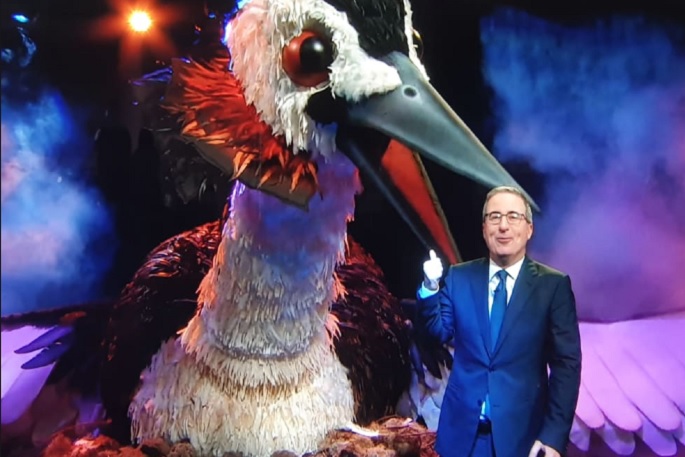 A giant mechanised grebe is part of comedian John Oliver's "global campaign" to stack New Zealand's Bird of the Century competition. Photo: Screengrab / Last Week Tonight show.
A giant mechanised grebe is part of comedian John Oliver's "global campaign" to stack New Zealand's Bird of the Century competition. Photo: Screengrab / Last Week Tonight show.
The 2021 competition was won, infamously, by the long-tailed bat.
Forest & Bird chief executive Nicola Toki believed there would be controversy to be had this year, too, with 77 native birds vying for the title.
Among them is the kākāpō, which was barred from the competition last year for being too popular.
"I'm still suffering the consequences in terms of complaints of kicking the kākāpō out of the competition last year," says Nicola.
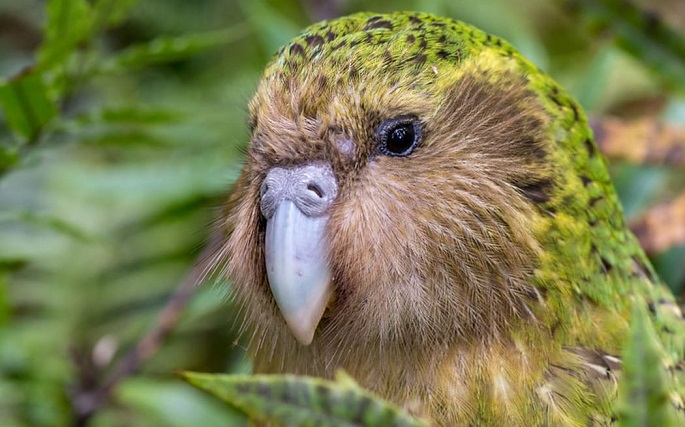 The kākāpō is taking on all comers. Photo: Jake Osborne.
The kākāpō is taking on all comers. Photo: Jake Osborne.
Five species that had become extinct within the last 100 years - the piopio, the bush wren, the whēkau or laughing owl, the South Island snipe and the huia - are also included.
She says these birds would provide a poignant reminder of the many bird species that were still endangered.
"Given that 82 per cent of New Zealand's bird species are still threatened with extinction, we want to remind people that their survival is still very much at stake."
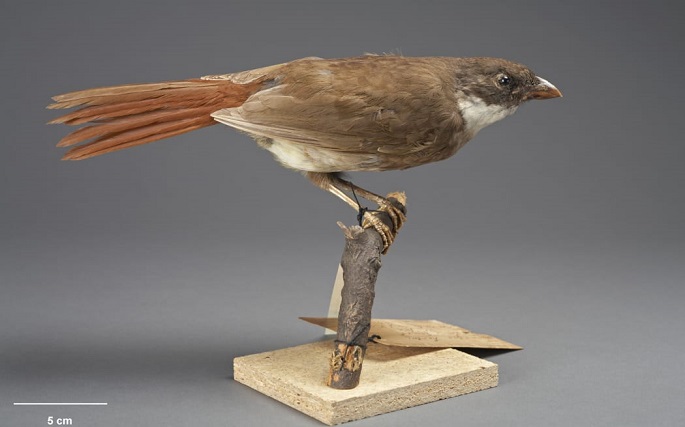 The last official sighting of the North Island piopio was in 1902. Photo: North Island Piopio, Turnagra tanagra, collected 8 September 1900, Waitotara district, New Zealand. CC BY 4.0. Te Papa (OR.000212).
The last official sighting of the North Island piopio was in 1902. Photo: North Island Piopio, Turnagra tanagra, collected 8 September 1900, Waitotara district, New Zealand. CC BY 4.0. Te Papa (OR.000212).
Nicola says the dates for this year's competition were shifted due to the general election.
"We're hoping that where there would seem to be sort of general malaise around the nature of the last type of election we've just had, this one should provide a lot more fun, entertainment, information and education."
Last year the votes only topped out at just over 50,000.
John Oliver's campaign
This year US talk show host John Oliver has waded into New Zealand's Bird of the Century competition, egging on viewers to flood the Forest & Bird-hosted ballot.
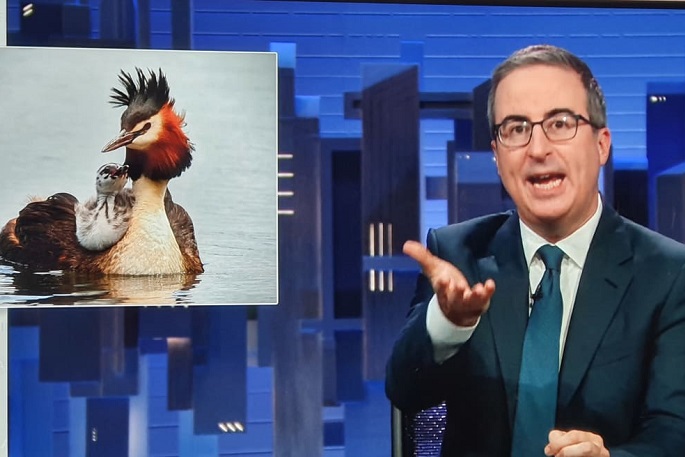 US comedian John Oliver making his campaign pitch for the Pūteketeke. Photo: Screengrab.
US comedian John Oliver making his campaign pitch for the Pūteketeke. Photo: Screengrab.
In last week's episode of his show 'Last Week Tonight', the comedian explained he was so passionate about the result of the "intense" competition, he has launched an "alarmingly aggressive" global campaign, to get the Pūteketeke, the Australasian Crested Grebe elected.
This included billboards next to the Arc de Triomphe in Paris, a bright neon cartoon advert on one of Tokyo's busiest intersections, billboards on a store in Mumbai and on the side of a roving truck in London, as well as a 'Lord of the Wings' poster on a bus shelter in Wellington and an airborne banner flown above Ipanema Beach in Brazil.
 Pedestrians on the Champs Elysees, near the Arc de Triomphe, walk past one of Oliver's Bird of the Century billboards. Photo: Screengrab.
Pedestrians on the Champs Elysees, near the Arc de Triomphe, walk past one of Oliver's Bird of the Century billboards. Photo: Screengrab.
 Photo: Screengrab.
Photo: Screengrab.
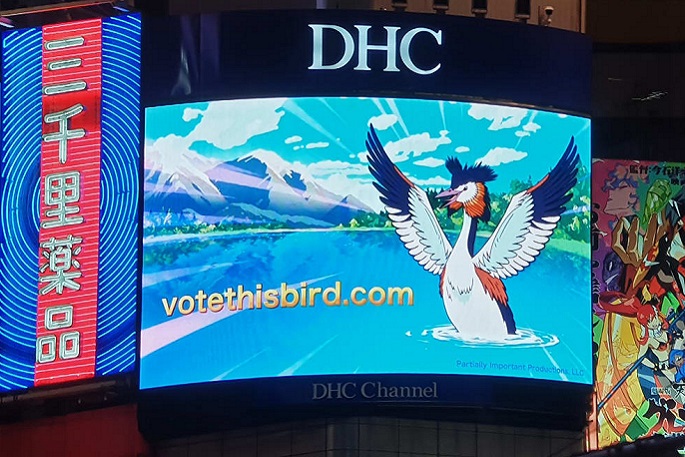 Photo: Screengrab.
Photo: Screengrab.
John Oliver has declared himself the Pūteketeke's "official campaign manager".
The bird is deserving of recognition, he explains, with its existence under threat, and estimates of fewer than 1000 of them left in New Zealand.
"Look at this beauty... even its name is fun to say, it feels like your tongue is tap-dancing," says John.
He points out voting requires only a valid email address, which he says means overseas voters have a shot at stacking the competition:
"Last year's rock wren won with 2894 votes - I'm pretty sure we can beat that.
"We are going all out for this bird. I don't just want the pūteketeke to win, I want it to win in the biggest landslide in the history of this magnificent competition. After all, this is what democracy is all about - America interfering in foreign elections."
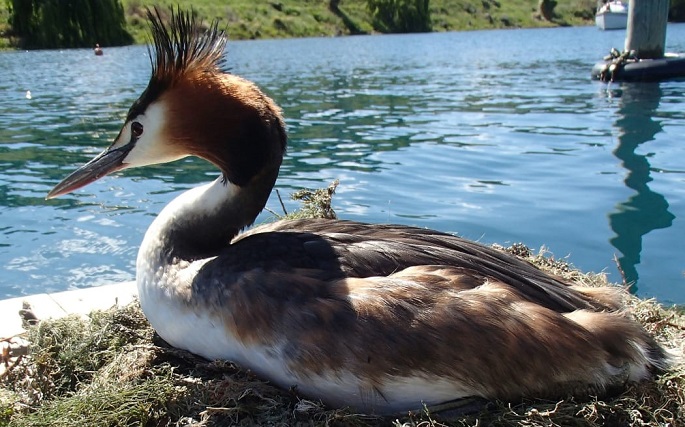 A US-funded campaign is behind efforts to tern the tide in favour of the Australasian crested grebe. Photo: RNZ / Alison Ballance.
A US-funded campaign is behind efforts to tern the tide in favour of the Australasian crested grebe. Photo: RNZ / Alison Ballance.
This year the competition was changed from 'Bird of the Year' to 'Bird of the Century' to mark Forest & Bird's centennial.
Nicola told Morning Report she was unperturbed by John Oliver's attempt at fixing the vote, and their website had held up.
"It's fair to say that a fair amount of weight was applied to work on it. My team working on it has had very little sleep. We're pretty impressed that the website held up, given the thousands and thousands of votes that came in."
The vote-rigging was not unexpected, as the team behind John's show had been in touch earlier this year.
"They were keen to be involved and we said, 'Go for it!'"
"You need to be a bird lover and someone with a valid email address. As John Oliver figured out, it doesn't matter where in the world you are."
The controversy around this latest flurry of votes did not bother Toki.
"We rise to a challenge here in New Zealand - let's treat this as our new Everest, to show we can punch above our weight."
It was not the first time foreign influence had poked its beak into the competition - Australian interference was detected during the 2018 campaign, with a person in Perth voting more than 300 times in one night for the shag (kawau) to win.
And it seems John Oliver was no spring chicken when it came to the mottled history of the Bird of the Year, the presenter unfolding a brief history of how the competition had ruffled feathers in previous years, detailing "injustices" and scandals.
Among the previous candidates lambasted by John was the white-faced heron - "it looks like a pigeon took anabolic steroids - I hate this bird" - and the long-tailed bat, which flew through to a win in 2021 on a technicality, despite not being a bird.
Instead, Oliver sided with the kākāpō, railing against its past disqualification.
"This bird, the kākāpō, was disqualified because it had already won twice - which is bull***, we don't do that for other awards - oh, sorry Beyoncé, but since you've already won 32 Grammys - you are disqualified from now on so that someone worse than you can win... The kākāpō earned those wings, it's the world's fattest parrot, and... they're also friendly and they smell nice."
However, John's love for the kākāpō was not strong enough to sway him to champion the giant parrot, back on the ballot for 2023. Instead, he was drawn by the grebe's "great hair" and slick family-friendly appeal.
"There are so many fun facts about it, like the fact that they are known for carrying their babies on their backs, which is adorable, and both parents will incubate their eggs and tend to the chicks - they give each other space to co-parent.
"And you want elegance? They have a mating dance where they both grab a clump of wet grass and chest bump each other before standing around unsure about what to do next - I have never identified with anything more in my... life.
"They are weird puking birds with colourful mullets, what's not to love here?"
RealNZ champions the Brook Waimārama Sanctuary's campaign for the kākāriki karaka
A local conservation advocate is crying fowl over the foreign interference in the Bird of the Century campaign.
RealNZ has lobbed the bombshell claim that British-American comedian John Oliver's heavyweight support for the pūteketeke is tantamount to Russia's meddling in the 2016 US Presidential election.
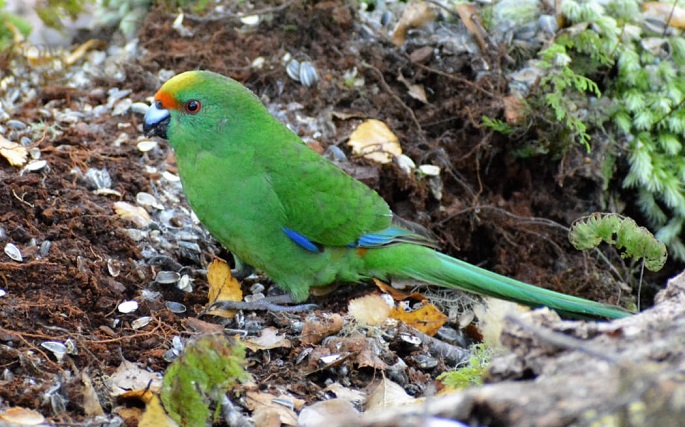 A population of kākāriki karaka - a species that was twice declared extinct and then rediscovered - has been successfully reintroduced to Canterbury's Hawdon Valley. File photo Photo: Sean McGrath.
A population of kākāriki karaka - a species that was twice declared extinct and then rediscovered - has been successfully reintroduced to Canterbury's Hawdon Valley. File photo Photo: Sean McGrath.
RealNZ chief revenue officer Scott McNab says it is not simply a case of being green with envy - unlike their preferred bird, the kākāriki karaka.
Tucked away on the doorstep of Nelson’s CBD, the Brook Waimārama Sanctuary which is also the kākāriki karaka's campaign manager for the competition, is now home to the largest population of these birds on the mainland and is proud as punch to stand behind these flamboyant, orange-banded divas for Bird of the Year.
Scott and the team at RealNZ have sent sending something of a Dear John Letter to John Oliver.
"What we saw from Mr Oliver reminded us a little bit of how the Russians interfered in US election previously," says Scott.
"It didn't feel quite right to us, so we decided we would do our best to give the kākāriki karaka a chance to win."
That had meant local billboards to return a local voice to the campaign.
But Scott admitts to not being above the same nefarious loophole John Oliver had identified and the tourism company would be tapping into its global database and social media to recruit support from abroad.
The real key, however, was Aotearoa.
"Our belief is that while he might be going global, if we can influence passionate New Zealanders, hopefully we can show that Kiwis still have global power and can deliver a great outcome just by getting New Zealanders heavily behind it," says Scott.
RealNZ had long been a supporter of the little green parrot.
"We are huge believers in this species. We've just raised $175,000 for it and we think it's a pretty special parrot, and with only 350 left in New Zealand we think we need to raise awareness of it."
That support included an effort in conjunction with the Department of Conservation and Ngāi Tahu to attempt to translocate kākāriki karaka back into Fiordland.
Scott accepts they are facing an uphill battle, but so are kākāriki karaka in the wild.
"We've always believed in the plucky underdog and New Zealanders at their core believe the underdog can stand up and defeat the bigger nations, and so we are hoping this is another example of that."
While RealNZ hops to rally support for its bird on the home stretch of the campaign, the real win would be long term, says Scott.
"Long-term for us it's more about the conservation piece and the more awareness we can raise, the better. As we look to start the translocation project, that's actually more important for us than delivering this result in the short-term."
To vote for the kākāriki karaka click here
Nicola told Morning Report overall, the enthusiasm in the competition has been a blessing.
"Right now, the entire world and especially New Zealand is facing a biodiversity crisis and part of that crisis is people not feeling connected enough or being able to celebrate the things that make our place so special," said Toki.
"The more people talking about our native wildlife in New Zealand and how important that is, particularly off the back of another kind of election, is great to me."
Nicola says her team are working around the clock to sort through every single vote, with the winner to be announced after Wednesday morning.
There's one more day left to vote in the Bird of the Century competition. To vote, click here:

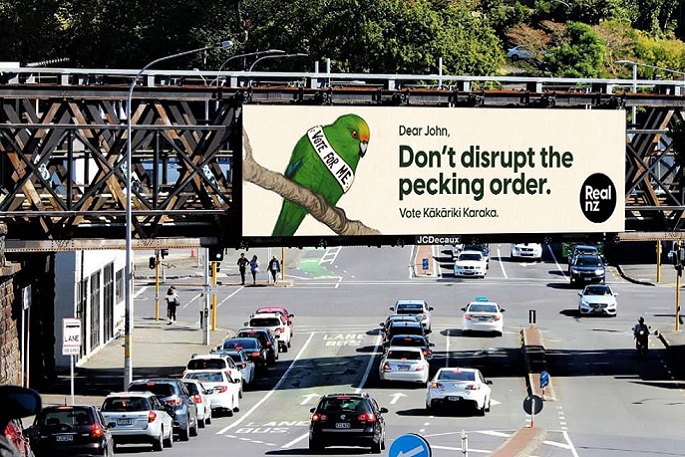

0 comments
Leave a Comment
You must be logged in to make a comment.